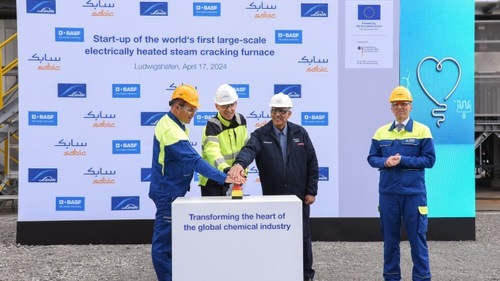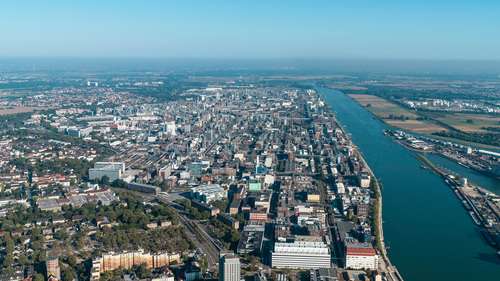BASF, SABIC, and Linde celebrate the start-up of the world's first large-scale electrically heated steam cracking furnace at Ludwigshafen demoplant, Germany
BASF, SABIC, and Linde have inaugurated the world’s first demonstration plant for large-scale electrically heated steam cracking furnaces. Following three years of development, engineering, and construction work, the regular operation of the demonstration plant is now ready to start at BASF’s Verbund site in Ludwigshafen, Germany. In March 2021, the three companies signed a joint agreement to develop and demonstrate solutions for electrically heated steam cracking furnaces.
Steam crackers play a central role in the production of basic chemicals and require a significant amount of energy to break down hydrocarbons into olefins and aromatics. Typically, the reaction is conducted in furnaces at temperatures of about 850 degrees Celsius. Up to now, these temperatures have been reached by using conventional fuels. The demonstration plant aims to show that continuous olefin production is possible using electricity as a heat source. By using electricity from renewable sources, the new technology has the potential to reduce CO2 emissions of one of the most energy-intensive production processes in the chemical industry by at least 90% compared to technologies commonly used today.
The demonstration plant, which produces olefins, such as ethylene, propylene, and possibly also higher olefins from saturated hydrocarbon feedstock, is fully integrated into the existing steam crackers in Ludwigshafen. The upcoming operation serves the goal of gathering data and experiences about material behavior and processes under commercial operating conditions for the final development of this innovative technology to industrial market maturity. In two separate demonstration furnaces, two different heating concepts will be tested. While in one furnace, direct heating applies an electric current directly to the cracking coils, in the second furnace, indirect heating uses radiative heat of heating elements placed around the coils. The two electrically heated furnaces together process around 4 tons of hydrocarbon feedstock per hour and consume 6 megawatts of renewable energy.
To support the development of the novel furnace technology, the project was granted €14.8 million by the German Federal Ministry for Economic Affairs and Climate Action under its “Decarbonization in Industry” funding program. The program is supporting energy-intensive industries in Germany in their efforts to achieve carbon neutrality.
“With the development of electrically operated steam cracking furnaces, we are getting our hands on a key technology that will help to significantly reduce greenhouse gas emissions in the chemical industry. It fills me with pride and joy that we have achieved this success together with our partners SABIC and Linde. The demonstration plant here in Ludwigshafen will provide us with valuable experience on the final step towards the industrial application of this technology”, said Dr. Martin Brudermüller, Chairman of the Board of Executive Directors of BASF SE.
Abdulrahman Al-Fageeh, CEO of SABIC stated: “The e-furnace’s technology holds huge potential for the sustainability of the global petrochemical industry. It can demonstrate the role that renewable electricity can play in higher efficiency and low-emission chemical processing. Through close collaboration, teamwork, intellectual property development, and advancing the best technical solutions holistically, the teams at SABIC, BASF and Linde have brought this project to this key stage. We are proud to be here together today to celebrate the power of collective action on our journey toward a circular carbon economy.”
“It is our common goal to demonstrate that it is possible to electrify the petrochemical industry and to operate a steam cracker with sustainably generated electricity. This outstanding joint project is a significant proof of how together we can develop ground-breaking technologies that will advance us on the journey towards net-zero CO2 emissions and climate-neutral industry,” said Jürgen Nowicki, CEO of Linde Engineering. “The STARBRIDGE™ technology brings the vision of an emission-free petrochemical industry a step closer.”
Based on the combined knowledge and intellectual property of the three parties collaborating to develop the new technologies, the demonstration unit in Ludwigshafen will be operated by BASF. Linde was responsible for the engineering, procurement, and construction of the plant. Linde will in the future commercialize the developed technologies under the new trademark STARBRIDGE™, enabling the petrochemical industry to decarbonize by replacing conventional fired technologies.
Categories
Investments
2023-01-01
at BASF SE, Ludwigshafen (DE)Countries
Companies
Latest news
Ports of Duisburg and Rotterdam advance energy transition together
Port of Rotterdam →With this LoI, the two major European logistics hubs reinforce their goal of jointly developing sustainable transport corridors via waterways as well as future-oriented initiatives for the energy t...
BASF constructs new electronic grade ammonium hydroxide plant in Ludwigshafen
BASF SE, Ludwigshafen →State-of-the-art facility to support the development of the advanced European semiconductor industry. New capacity meets growing demand for the manufacturing of chips in Europe
SynPet Technologies to bring emerging technology in plastics recycling to the Port of Antwerp-Bruges
Port Of Antwerp →SynPet Technologies is investing €300 million in an innovative facility that converts all types of plastics into a circular naphtha substitute without pre-treatment and with efficient conversion ra...
NEXTCHEM awarded a feasibility study by Mana Group and Equinor for the production of sustainable fuels in Norway leveraging its NX Circular™ technology
With the support of NEXTCHEM, Mana (NG Nordic) and Equinor are entering an early-stage strategic partnership to explore the potential development of the Nordics' first large-scale waste-to-methanol...




